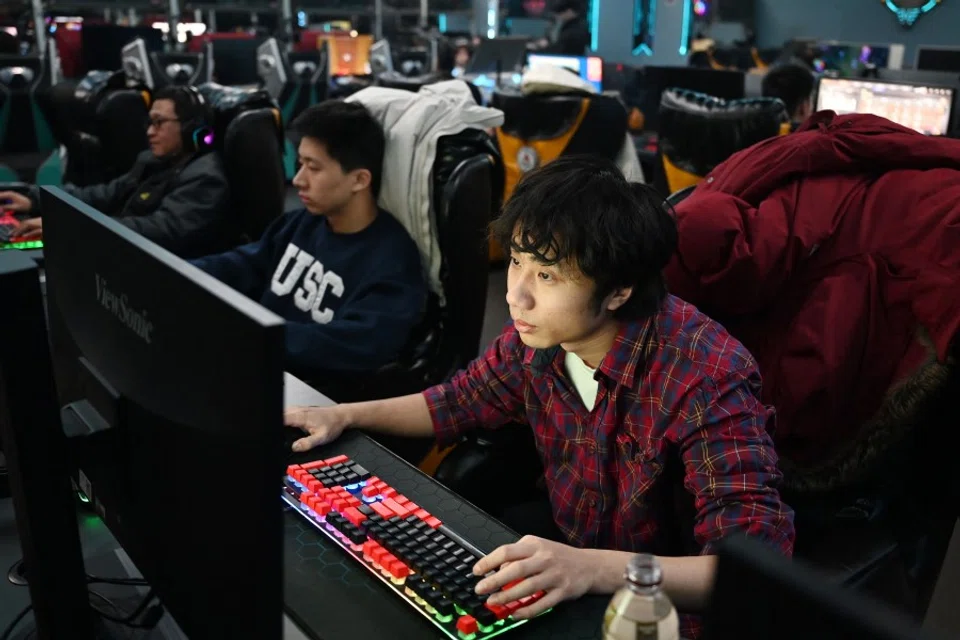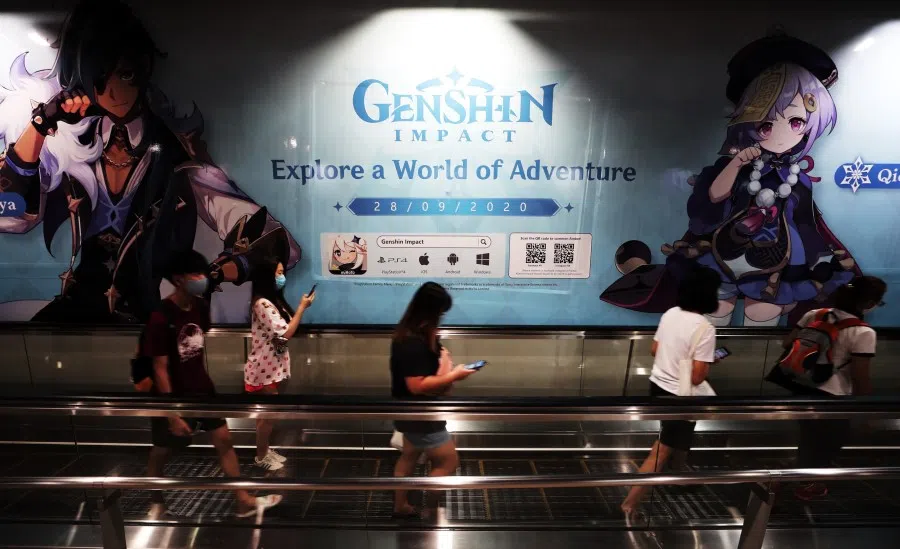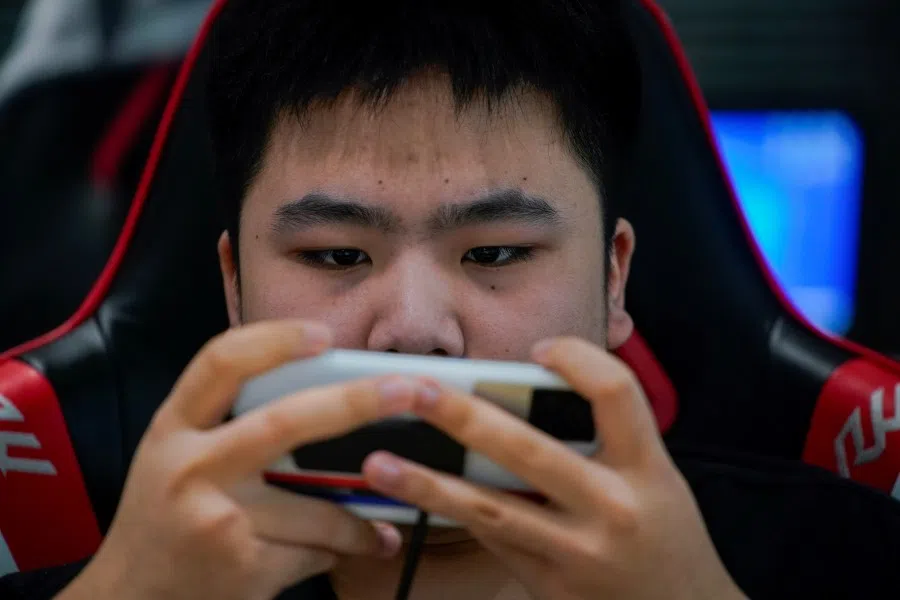No more easy wins for Chinese mobile games in overseas markets
With games companies outside of China stepping up their efforts with quality games, Chinese games companies are increasingly feeling the challenge in maintaining their position in the industry. How will the industry develop from here? Zaobao journalists Li Kang and Lee Chan Hui find out.

Every day, 26-year-old computer engineer Li Mingxuan logs in to his Honkai: Star Rail mobile game account to complete his daily missions during his commute to work.
However, Li has recently observed that Chinese games have become less popular. Ten months after its launch, Honkai: Star Rail by Chinese game company miHoYo is gradually losing traction in gaming circles.
In an interview with Lianhe Zaobao, Li said, "This is normal because gaming crazes are cyclical and gamers will get bored. It was the same for Genshin Impact."
Genshin Impact is an action role-playing mobile game launched by miHoYo back in September 2020, which saw rapid success following its launch.
According to figures from data-analysis platforms, Sensor Tower and data.ai, Genshin Impact made US$1 billion (or S$1.344 billion) just 171 days after its launch. After 40 months, it became the fastest mobile game to earn US$5 billion in revenue, 11 months sooner than next-fastest Clash of Clans, developed by a Finnish gaming giant.
With domestic pressures such as greater scrutiny from Chinese regulators, the temporary suspension of approval for new games, limiting gaming time for Chinese youths, and an increasingly crowded domestic market, Chinese game developers have long had to either head overseas or make an exit.
In the last decade, from Chinese gaming industry titans like Tencent and NetEase to newcomers like miHoYo, many gaming companies have set their sights on overseas markets, with the success of Genshin Impact due in no small part to overseas gamers like Li. According to market intelligence website AppMagic, nearly 60% of the game's revenue in 2023 came from outside China.
However, as competition overseas heats up, easy wins in the global gaming market are becoming harder to come by for Chinese gaming companies.
A 2023 report on the performance of Chinese games in overseas markets by the China Audio-video and Digital Publishing Association Game Work Committee, China Gaming Industry Research Institute (中国游戏产业研究院) and CNG (a research agency) found that the overseas earnings of Chinese games peaked at US$18.013 billion in 2021 before falling for the first time ever by 3.7% to US$17.346 billion in 2022. In 2023, it fell further by 5.65% to US$16.366 billion.
... the entry of European and American game developers has made the mobile gaming sector more competitive. - Ivan Su, Senior Equities Analyst, Morningstar

Even a gaming phenomenon like Genshin Impact was wildly popular in overseas markets for only about three years. Data from mobilegamer.biz indicates that the game's global revenue was US$112 million in February 2023 but fell sharply by half to US$51.9 million in June of the same year.
Figures from mobile advertising intelligence platform, AppGrowing, also show that the number of active Genshin Impact users fell by 41% from 32.79 million in January 2023 to 19.29 million in July of the same year.
Japanese game streamer, Nilu (pseudonym), told Lianhe Zaobao that he rode the Genshin Impact craze to start a YouTube streaming channel in 2022. While his channel attracted many gamers initially, he is getting fewer views for his Genshin Impact videos nowadays and he has had to seek alternatives.
Chinese mobile game developers are not entirely at fault for the fall in their overseas takings as they are also impacted by the post-pandemic decline of the mobile gaming market in general. Ivan Su, a senior equities analyst with investment research and fund rating agency Morningstar, shared that global mobile gaming income fell by 6.4% in 2022, and since it is mainly Chinese mobile game makers that expanded overseas, it is unsurprising that their earnings declined.
However, Su feels that the bottleneck faced by Chinese mobile games in 2023 is due to a shortage of high-quality new titles from game developers and sales-based games (those that rely on in-app purchases and advertising to get new downloads and registrations) losing their competitiveness. At the same time, the entry of European and American game developers has made the mobile gaming sector more competitive.
An industry insider told Zaobao that in the last five years, European, American, Japanese, and South Korean gaming companies did not place as much emphasis and were slower to learn than their Chinese counterparts in the R&D phase of mobile games, allowing Chinese companies to reap the dividends during the period.

But now, gaming developers from these countries are starting to pay attention to mobile gaming. With their wealth of experience in console gaming, they have what it takes to reconfigure the global mobile gaming landscape.
There have already been blockbuster mobile games from European and American companies. Last April, American game developer Scopely launched Monopoly GO!; by December, the game ended Tencent's Honour of Kings' 22-month streak as the most popular mobile game around the world.
Besides Tencent, NetEase, Moonton, and Yoozoo Games, over the past couple of years, Chinese game makers like miHoYo, Lilith Games, Hypergryph, Papergames, and others have also set up shop in Singapore.
Developing the Southeast Asian market
Chinese game makers still derive most of their overseas revenues from mature markets, with 50% of such earnings coming from the US, Japan, and South Korea. However, Southeast Asia is fast becoming an overseas market that these companies are looking to develop.
In recent years, Singapore has become a gateway for Chinese game makers into Southeast Asia. Based on our rough estimate, there are at least 12 Chinese gaming companies which have set up either their overseas headquarters or offices here.
Besides Tencent, NetEase, Moonton, and Yoozoo Games, over the past couple of years, Chinese game makers like miHoYo, Lilith Games, Hypergryph, Papergames, and others have also set up shop in Singapore.
In October 2023, a report published by video game market research company, Niko Partners, predicted that the PC and mobile gaming market in the six Southeast Asian countries of Indonesia, Malaysia, the Philippines, Singapore, Thailand, and Vietnam will reach US$5.8 billion in 2023 and grow further to US$7.2 billion by 2027.

Oliver Ye, who is in charge of Southeast Asia publishing and esports at Level Infinite, a Tencent gaming brand, told Zaobao that his company's global overseas revenue in the Southeast Asian region has maintained a steady growth trajectory.
For instance, its first game title, PUBG Mobile, garnered more than 650 million views from Southeast Asian viewers for its esports events held in 2023.
"In the long run, game developers that rely on quantity instead of quality will gradually lose their market share and be replaced by major developers that focus on producing top-quality gaming titles." - Su
Heading overseas still the best way out for Chinese game developers
Amid domestic market saturation and regulatory uncertainty, expanding overseas is still the best way out for most Chinese game developers. Their competitive strengths of strong liquidity, short lead time, and low labour cost mean that they will continue to be major players in the global gaming market.
However, industry insiders also feel that these advantages alone may not allow Chinese game developers to maintain their competitiveness overseas in the long term.
Ivan Su from Morningstar pointed out that in game development, speed is no guarantee for quality. On the contrary, outstanding titles often require long periods of R&D and meticulous fine-tuning.
He said, "In the long run, game developers that rely on quantity instead of quality will gradually lose their market share and be replaced by major developers that focus on producing top-quality gaming titles."
This article was first published in Lianhe Zaobao as "中国游戏出海 告别"躺赢"时代".






